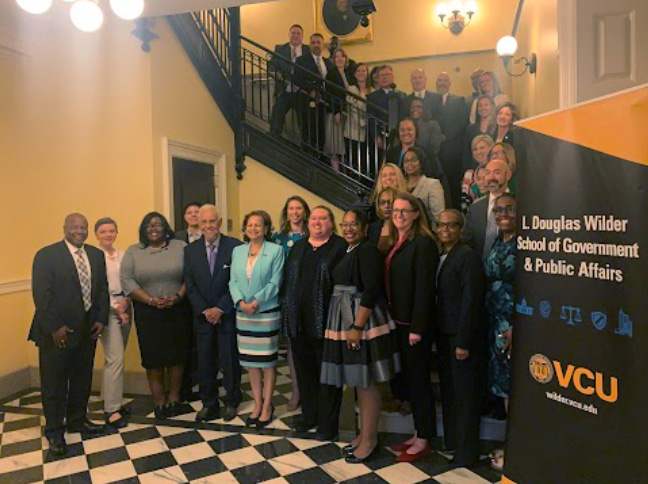The Spring 2023 Class of the Virginia Executive Institute (VEI) celebrated their program completion by gathering to present group project findings. VEI provides a dynamic forum for leaders to collaborate across a network of state executives committed to developing their leadership strengths and becoming change agents for Virginia's future. More than 1,400 leaders in Virginia state government are VEI graduates, and stay connected through the Virginia Executive Institute Alumni Association.
For two weeks, leaders from various agencies around Virginia joined together to come up with innovative ways that the state can engage in creating a more welcoming workplace for members of Gen Z as they begin their professional careers, seek to retain employees, provide mental health support accessibility and to establish more flexibility for employees.
Each group focused on different ways they can engage every generation of workers from Baby Boomers to Gen Z to help make the Commonwealth of Virginia an even better place to work and raise a family.
PRESENTATIONS
CREATING A WELCOMING WORKPLACE FOR GENERATION Z
Jerome Butler: DMV, Kelly Gee: Lottery, Will Johnson: VCCS, Patrice Jones: DVS, Jolene Smith: DHR,
Berkeley Wolford: APA
The U.S. Bureau of Labor Statistics projects that Gen Z will account for 30% of the U.S. civilian labor force by 2030. The Commonwealth of Virginia employs well over 100,000 state employees to administer the multitude of services our citizens expect from their government. This presentation will explore recommendations on how the Commonwealth can modify its workforce benefits to attract and retain the next generation of public service employees.
COMMUNITY CONNECTIONS: INVESTING IN VIRGINIA’S FUTURE WORKFORCE BY INVESTING IN PUBLIC SCHOOLS TODAY
Jerome Brooks: DEQ, Brandi Jancaitis: DVS, Susan Landis: VEC, Debbie Linn: VMFA,
Ponnette Smith: DHRM, Alana Tucker: DSS
This project seeks to invest in Virginia’s future workforce by addressing the unique needs and challenges of under-resourced rural public schools. Our goal is to bolster existing Adopt-a-School programs by leveraging state volunteer service hours to support the foundational needs of rural schools and provide resources for teachers and students. We will propose a pilot program to connect state employees to schools, providing the means to gather input from schools and community stakeholders, tailor support according to needs, and mobilize businesses and citizens to help local schools meet their critical needs.
TRANSFORMING VIRGINIA’S PUBLIC SECTOR EMPLOYEE RETENTION MODEL
Todd Barnes: DVS, Lori Flannery: Virginia 529, John Kissel: DMAS, Paige Pearson: DWR,
Nicole Thompson: Virginia Housing, Kristina Williams: TAX
Exploring and analyzing the current retention processes across state agencies and recommending changes necessary to retain a qualified workforce.
ACCESS TO MENTAL HEALTH SUPPORT FOR STATE EMPLOYEES
Angel Deem: VDOT, Cynthia Edwards: VITA, Dan Plain: DMAS, Renee Sacra: DEQ, Robbie Talbert: DOF
This presentation will explore state employee access to mental health support services and the potential to expand support and services. Opportunities for leadership training, expanded awareness, and normalizing mental health needs will also be addressed.
EXPLORING EMPLOYEE CHOICE FOR RECEIVING TOTAL COMPENSATION
Brad Berg: DMV, Lauren Clarke: DGS, Lois Fegan: VADOC, Robyn Jennings: DVS Jay Styles: VDOT,
Olivia Wilson: VDACS
Commonwealth of Virginia agencies struggle to compete with the private sector to hire and retain talented employees. While private sector salaries are usually higher than government salaries, government positions often have better benefits than similar jobs in the private sector. The commonwealth has pushed the concept of “total compensation” to get applicants to see the true value of the government position compared to jobs in the private sector. This approach has mixed results. Often, benefits go unused, resulting in inefficient use of funds dedicated to employee compensation.
